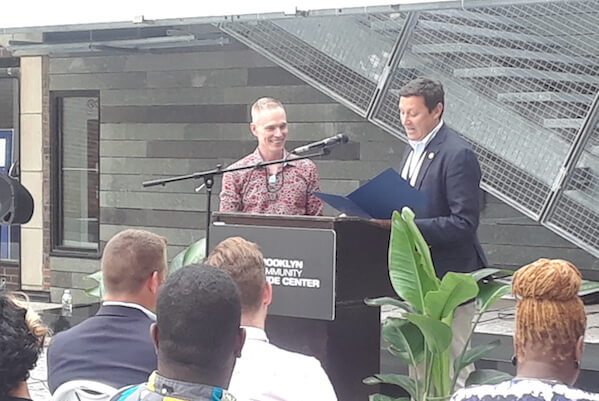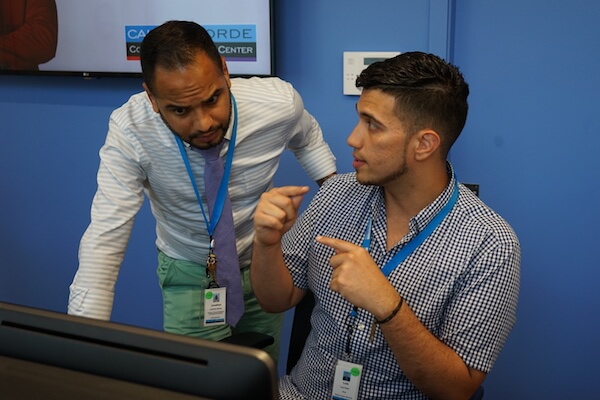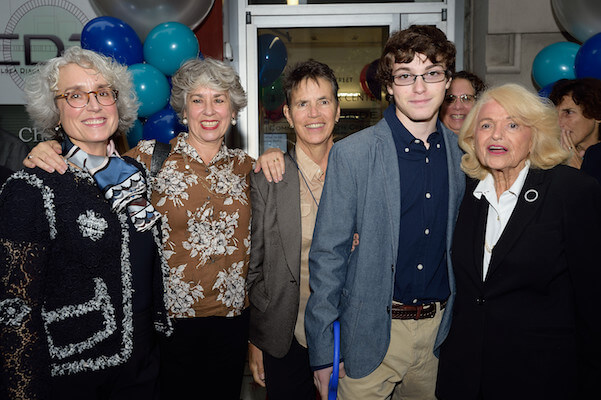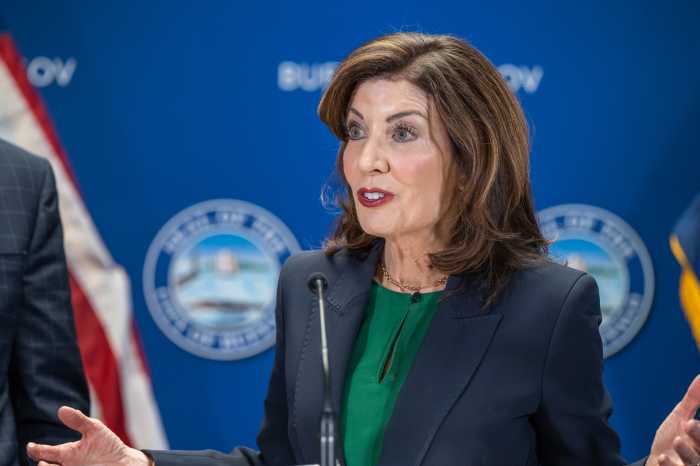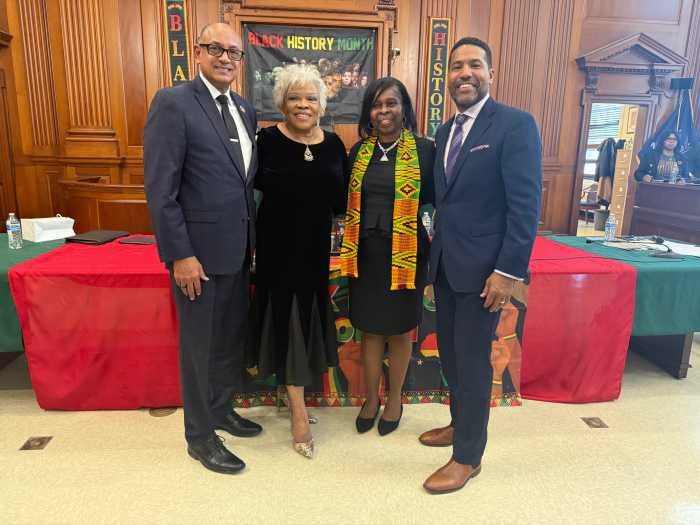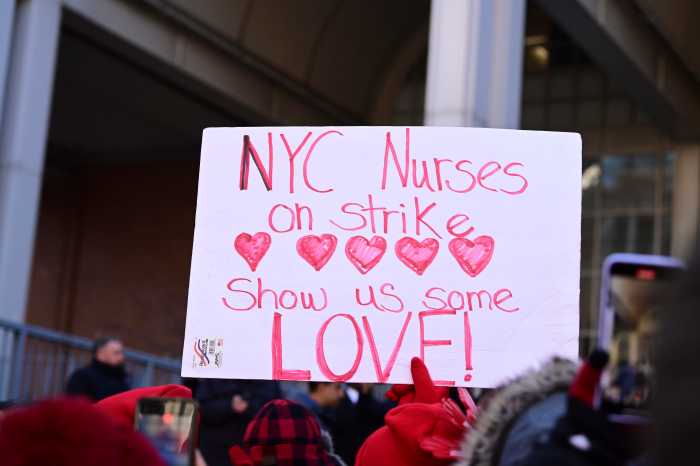With the two-year anniversary of the Food and Drug Administration (FDA) approving Truvada for pre-exposure prophylaxis (PrEP) and Americans only slowly adopting the HIV prevention tool, the Callen-Lorde Community Health Center may be writing a significant number of the prescriptions for PrEP in the country.
“I don’t know that it’s a singular achievement,” Jay Laudato, executive director of the Chelsea health clinic, told Gay City News. “I don’t think hospitals are doing tons of this, but we do know hospital partners who are doing PrEP.”
In 2012, the FDA approved using a daily dose of Truvada to prevent HIV infections. Gay and bisexual men who have condomless sex, HIV-negative people in a relationship with an HIV-positive person, and sex workers could all be candidates for PrEP. Few people who are at risk for HIV infection appear to have chosen to take the drug and various explanations are given for the slow uptake.
With gay, bi men slow to adopt anti-HIV drug approach, Chelsea clinic can’t serve them fast enough
In studies, Gilead Sciences, the company that manufactures and markets Truvada, estimated that 2,319 “unique individuals” started PrEP between January 1, 2012 and September 30, 2013. That increased from the estimated 1,774 “unique individuals” starting PrEP between January 2011 and March 2013. There is overlap between the two estimates and it is unknown how many of those individuals are still taking the drug.
Since February of this year, Callen-Lorde has written 110 PrEP prescriptions for clients who are not part of any clinical study, suggesting the agency could be responsible for a significant percentage of the PrEP prescriptions written overall.
Sarit Golub, a professor at Hunter College who is working on PrEP studies at Callen-Lorde, said the agency spent a year training staff on how to identify PrEP candidates and how to discuss the drug regimen with them.
“We cannot get people in the door fast enough,” Golub said at a June 17 meeting in Manhattan on PrEP messaging. “If we had the capacity, we could double the volume.”
Chicago’s Howard Brown Health Center reported comparable numbers with 150 clients on PrEP, and Legacy Community Health Services in Houston has 45 clients on PrEP. Other health agencies are reporting lower numbers. At the meeting, Kimberleigh Smith, the policy director at Harlem United, an AIDS group, reported that her agency had two clients on PrEP. Dr. Antonio Urbina, associate medical director at St. Luke’s-Roosevelt Hospitals, estimated his agency put 10 clients on PrEP in the past six months.
Fenway Health in Boston, which had 782 clients on PrEP in clinical studies, told Gay City News that it has 25 clients on PrEP who are not part of a clinical study. Other clinics around the country did not respond when asked how many clients they had on PrEP.
Callen-Lorde is known for its work on sexually transmitted diseases and sexual health generally so clients there may be more inclined to discuss and try PrEP. Laudato said the agency has clients who have a primary care physician, but come to the clinic when they need to talk to a healthcare professional about their sex lives.
“People are known to use Callen-Lorde for sexual health,” he said. “People who know about this and who are engaged in their own sexual health seek us out.”
Callen-Lorde may also see far more HIV-negative clients than an agency like Harlem United, which is better known for working with HIV-positive people, who are not PrEP candidates. Callen-Lorde saw 15,000 clients last year and 12,000 were HIV-negative. It did 6,000 to 7,000 screenings for sexually transmitted diseases and prescribed post-exposure prophylaxis (PEP) to 600 clients last years. PEP is a 28-day course of anti-HIV drugs that prevents HIV infection from taking hold following an exposure. A person who is completing a PEP regimen could be a candidate for PrEP.
“We have a number of staff and counselors here who can be brought in and have multiple conversations with patients,” Laudato said. “We have a lot of conversations.”
The slow uptake of PrEP generally has a number of explanations. One, which is supported by several recent studies, is that people don’t know about it, including doctors who might prescribe it. At the meeting, Terri Wilder, who works at the Spencer Cox Center for Health, a clinic affiliated with St. Luke’s-Roosevelt Hospitals, said doctors are asking for training on PEP, which has been used for over 20 years.
“As much as people are excited about PrEP, I’m just now getting a lot of requests for PEP training,” she said.
Janet Weinberg, the chief operating officer at Gay Men’s Health Crisis, said her AIDS agency sent a film crew into the streets to ask people about PrEP as part of a series of town halls the agency is producing on the HIV prevention tool.
“What we learned from it is people need more information,” Weinberg said at the June 17 meeting. She said that when people were asked about PrEP, “the most common answer was, ‘Prepare for what?’”
In reporting the findings of an earlier study, Golub said white gay men resisted taking PrEP because they feared being viewed as promiscuous while black gay men feared people would think they were HIV-positive if they took PrEP.
Wilder said the answer is more physician training and more messaging.
“We need to think about penetration,” she said. “We need to think about medical conferences.”


